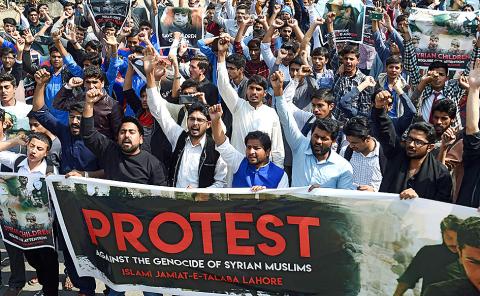A Russia-ordered “humanitarian pause” has gone into effect to allow civilians to leave a rebel-held enclave near Damascus, giving a brief respite to the residents of the besieged area that has been under intense attack by the Syrian government for weeks.
Syria’s state-run al-Ikhbariya TV broadcast footage from a crossing point manned by the Syrian military between eastern Ghouta and Damascus, saying preparations were under way to allow civilians to leave, including medical cars.
The Wafideen crossing point is near Douma, one of the largest towns in eastern Ghouta, only a few kilometers from Damascus. The station showed small buses waiting at a parking area, but there were no signs of anyone coming out of the enclave.

Photo: AFP
Al-Ikhbariya’s journalist on the ground said mortar shells had targeted the crossing, preventing civilians from leaving.
The five-hour humanitarian pause ordered by Russian President Vladimir Putin comes as a UN ceasefire failed to take hold in eastern Ghouta, and residents and aid groups said such unilateral pauses are not internationally monitored.
The enclave’s residents fear they could face harassment and possibly arrest if they go into government areas, after years of living in the rebel-held enclave.
International Committee of the Red Cross spokeswoman Ingy Sedky said humanitarian corridors need to be well planned and must be implemented with the consent of parties on all sides.
“This is essential so that people can leave safely, if they chose to do so,” she said. “And for those who decide to leave, all measure should be taken to provide assistance, protection and shelter to them, and those who remain must be protected from any attacks.”
A weekend resolution unanimously approved by the UN Security Council for a 30-day ceasefire across Syria failed to stop the carnage in eastern Ghouta, where more than 500 people have been killed since last week.
Rami Aburrahman of the Syrian Observatory for Human Rights said violence has dramatically declined in eastern Ghouta overnight, but reported a number of shells yesterday morning. It was not immediately clear where they landed or who fired them, Abdurrahman said.
Douma activist Firas Abdullah said a bomb landed in the town after the pause began, as well as three ground missiles.
Civilians caught in the violence have mocked Putin’s order, saying it gives only a couple of hours of calm before violence resumes.
The Army of Islam, the largest insurgent group in Ghouta, said the pauses circumvent the UN resolution.

VAGUE: The criteria of the amnesty remain unclear, but it would cover political violence from 1999 to today, and those convicted of murder or drug trafficking would not qualify Venezuelan Acting President Delcy Rodriguez on Friday announced an amnesty bill that could lead to the release of hundreds of prisoners, including opposition leaders, journalists and human rights activists detained for political reasons. The measure had long been sought by the US-backed opposition. It is the latest concession Rodriguez has made since taking the reins of the country on Jan. 3 after the brazen seizure of then-Venezuelan president Nicolas Maduro. Rodriguez told a gathering of justices, magistrates, ministers, military brass and other government leaders that the ruling party-controlled Venezuelan National Assembly would take up the bill with urgency. Rodriguez also announced the shutdown

Chinese President Xi Jinping’s (習近平) purge of his most senior general is driven by his effort to both secure “total control” of his military and root out corruption, US Ambassador to China David Perdue said told Bloomberg Television yesterday. The probe into Zhang Youxia (張又俠), Xi’s second-in-command, announced over the weekend, is a “major development,” Perdue said, citing the family connections the vice chair of China’s apex military commission has with Xi. Chinese authorities said Zhang was being investigated for suspected serious discipline and law violations, without disclosing further details. “I take him at his word that there’s a corruption effort under

China executed 11 people linked to Myanmar criminal gangs, including “key members” of telecom scam operations, state media reported yesterday, as Beijing toughens its response to the sprawling, transnational industry. Fraud compounds where scammers lure Internet users into fake romantic relationships and cryptocurrency investments have flourished across Southeast Asia, including in Myanmar. Initially largely targeting Chinese speakers, the criminal groups behind the compounds have expanded operations into multiple languages to steal from victims around the world. Those conducting the scams are sometimes willing con artists, and other times trafficked foreign nationals forced to work. In the past few years, Beijing has stepped up cooperation

Exiled Tibetans began a unique global election yesterday for a government representing a homeland many have never seen, as part of a democratic exercise voters say carries great weight. From red-robed Buddhist monks in the snowy Himalayas, to political exiles in megacities across South Asia, to refugees in Australia, Europe and North America, voting takes place in 27 countries — but not China. “Elections ... show that the struggle for Tibet’s freedom and independence continues from generation to generation,” said candidate Gyaltsen Chokye, 33, who is based in the Indian hill-town of Dharamsala, headquarters of the government-in-exile, the Central Tibetan Administration (CTA). It